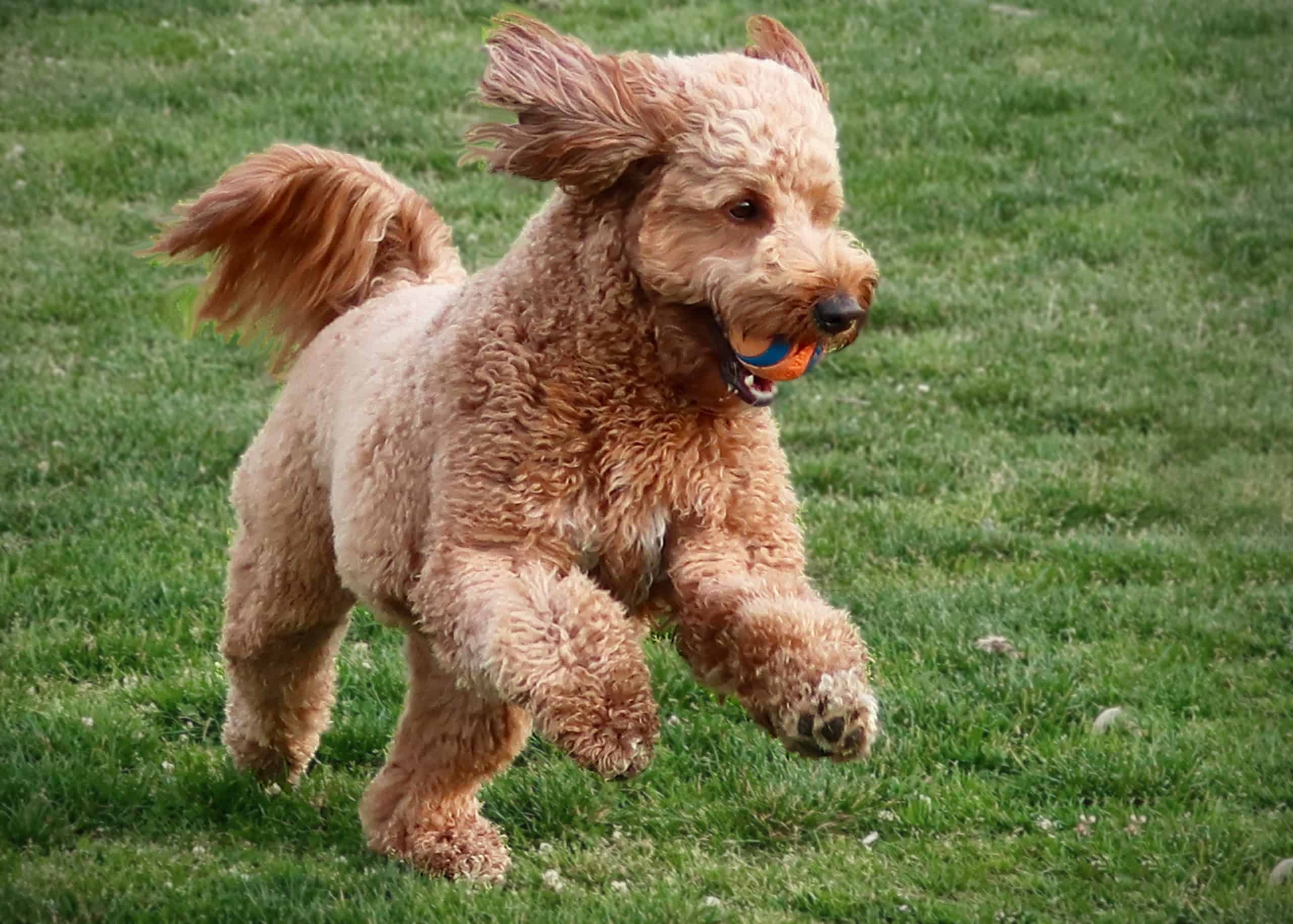Do Goldendoodles Like To Fetch?
Goldendoodles are the playful, intelligent, and energetic combination of their loving parents: the Golden Retriever and the Poodle. Just like human children can take on similar traits as their loved ones, puppy personalities often resemble those of their parents as well.
So, do Goldendoodles like playing fetch? The wits of a Poodle and the energy of a Golden Retriever ensure Goldendoodles enjoy a game of fetch among the best of them! This breed, which is active, highly-trainable, and energetic, is excellent for a first-time pet owner who enjoys the outdoors and is full of play themselves.
With this in mind, Goldendoodles make great pets for families with energetic children as well as any pet seeker looking for a dog-lifelong best friend. While the Goldendoodle is apt to like a game of fetch, it’s essential to consider the factors which contribute to creating the opportunity for this fun habit to build with your Goldendoodle.
[toc]
Do Goldendoodles Play Fetch?
Due to a combination of factors in their personalities, Goldendoodles make great pets for playing fetch. Consider the following:
First, Goldendoodles are intelligent. Their intelligence makes it far easier to train them and teach them to do tricks. Playing fetch can be just the beginning of the tricks you will be able to teach them!
Secondly, Goldendoodles are playful. Playful puppies are more likely to enjoy a repetitive game and do not grow tired of the repetition. Instead, they enjoy the predictability of playing a game of fetch with their favorite human. Knowing they can count on a day of play is vital to this breed.
Thirdly, Goldendoodles are athletic, which provides the stamina for a near or far retrieval of their favorite chew toy. As an athletic breed, the Goldendoodle requires plenty of exercises- an excellent bonding opportunity with their owner!
Not only are Goldendoodles natural fits for a game of fetch, but their personalities and love of play ensure it is a favorite pastime.
What Toys Are The Best To Play Fetch?
When picking a toy for your Goldendoodle, be sure to engage her senses and natural curiosity. You will want to choose a toy that is appropriately sized, has a distinct texture, and is malleable.
A good toy for the game of fetch will be able to fit in your dog’s mouth with ease (without the possibility of swallowing it while running). It should also bend easily enough that you can change its shape when pressing it in your hand. This will help your dog to grasp it securely before bringing it back to you.
What Makes A Goldendoodle Easy To Train?
A dog’s ability to be trained varies in combination with his or her temperament, level of intelligence, and innate personality.
The Goldendoodle Association of North America ranks Goldendoodles as the 4th most intelligent breed out of 150 breeds ranked. A smart dog is quicker to pick up on commands and helps both the dog and the trainer to stay motivated.
The Goldendoodle also has a friendly and affectionate personality. The combination of this with an energetic trainer can help the positive affirmation and learned commands to grow exponentially. Training is fun with this social and bubbly breed!
How To Teach A Goldendoodle To Play Fetch
As with anything, you are training your dog to do, be sure to use positive affirmation- a LOT. This can be done with treats or even just making sure your dog knows he is a “good boy” when he completes each step of the training process. An excited tone set by the trainer/owner will help the Goldendoodle to mirror in excitement. To teach the game of fetch, it is recommended to follow these steps:
- Pick a fetch toy they will like. For some dogs, this could mean purchasing a new dog toy to mix curiosity with excitability. For other dogs, it is easier to begin with a toy which they are already familiar with. Be sure to give both options a try and don’t give up too quickly.
- Add excitement by playing with the fetch toy. This can be done by moving the toy around, playfully petting while holding the toy, and keeping an upbeat and excited tone. Many dogs mirror the personalities of their owners. If an owner shows excitement towards the fetch toy, it is more likely that the dog will as well.
- Begin playing fetch indoors. Whether the individual Goldendoodle is of the “sit and watch” variety or is more likely to chase any moving object, it is easiest to begin new tasks in a familiar environment. Goldendoodles are more likely than not to pursue any object that is thrown. So, throw the fetch toy somewhere visible to the dog and praise him when he finds it.
- Choose a repetitive motion or noise to command his return. If your dog does not automatically bring the fetch toy back to you, try a motion/noise such as whistling, patting your leg three times, or something similar, which will tell the dog to “come.” Calling your dog’s name while he has the fetch toy in his mouth can also help to capture his attention. It can also be helpful to stand up or move slightly closer to your dog, so he brings the fetch toy towards the new moving subject- you. You’ll want to be consistent with your choice of signals here and include praise when he gets it correct.
- Add the word “fetch.” Once your dog has learned the signals affiliated with the game of fetch, you may add the word “fetch” as a command in accompaniment to the signals. Be sure to keep making the same motion/noise chosen in step 4. As your dog begins to recognize the word fetch, you can slowly start to remove the use of the motion/noise, as “fetch” will become the command which prompts his response.
- Move outdoors. After your dog accomplishes all of these tasks in a familiar environment, you will be ready to try the game in a new space. Your dog will be waiting for the cues you have worked hard to train him to respond to. Use these, and he will be sure to retrieve the fetch toy.
Now, you and your dog will be ready for hours of fun on-end. Be sure you are prepared for when your Goldendoodle begins bringing you his fetch toy without commands to show you he wants to play!
What Do I Do If My Goldendoodle Will Not Fetch?
If your puppy pal prefers to stick to one spot, gets easily distracted, or otherwise shows no preference to play a game of fetch, it can become frustrating to you as an owner who just wants to play. However, it is important not to show this frustration towards your dog. Instead, demonstrate continued excitement and consistency with added incentives for your dog. This can be in the form of a belly rub, new treat, or anything else you think your dog will like.
Other options to increase the excitement for a game of fetch include: change environments to a designated play area, introduce a new and fun toy, add a new, safe to eat smell/taste to the toy to stimulate curiosity, and likelihood of exploring the toy.
Related Questions
Do Goldendoodles have high levels of energy?
Goldendoodles are a popular breed because of their playfulness and easy-going personality. Often, this breed will be one of the most friendly in the local dog park. With this temperament (paired with a high level of intelligence), Goldendoodles require a high level of stimulation both mentally and physically. It is critical that this dog receives the opportunity for play, exercise, and engagement at least 30-60 concentrated minutes per day.
How long does it take for a Goldendoodle to calm down?
Because the Goldendoodle is a social breed, she is likely to be excited by other dogs and people through her younger dog years- possibly until she reaches 10-years-old. However, her level of energy will be noticeably higher in her puppy stages, until 8 to 14 months. Then she will begin slowly transitioning into a calmer state as she goes from young to old dog physically and mentally.
Do Goldendoodles bark frequently?
Similar in combined personality with the Goldendoodle parents, it is about a 50% chance that the Goldendoodle will bark. Golden Retrievers are said not to bark as much, while Poodles are more frequently “problem barkers.” Therefore, the environment in which your individual Goldendoodle lives can stimulate his innate urge to bark. To help reduce barking, be sure to provide plenty of playtime which will help to regulate your dog’s mental and physical need for stimulation.


